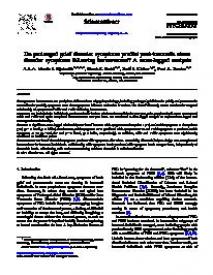Do prolonged grief disorder symptoms predict post-traumatic stress symptoms following bereavement? : A cross-lagged analysis
Background: Bereavement can precipitate different forms of psychopathology, including prolonged grief disorder (PGD) and posttraumatic
stress disorder (PTSD) symptoms. How these symptoms influence each other is unclear. The aim of this study was to examine the temporal
relationship of symptoms of PGD and PTSD following bereavement.
Methods: We included 204 individuals, confronted with the loss of a loved one within the past year, who completed self-report measures of
PGD and PTSD and again completed these measures one year later. We conducted a cross-lagged analysis to explore cross-lagged and
autoregressive relationships.
Results: A significant cross-lagged relationship was found between PGD symptoms at time point 1 (T1) and PTSD symptoms at time point 2
(T2) (β− = 0.270, p b 0.001). Furthermore, PGD symptoms at T1 predicted PGD symptoms at T2 and PTSD symptoms at predicted PTSD
symptoms at T2 (β− = 0.617 and β− = 0.458, ps b 0.001, respectively). In addition, PGD and PTSD symptoms were significantly
correlated on both time points.
Conclusions: We found that PGD symptoms predict PTSD symptoms after a loss. Potentially, this could help to design new strategies and
interventions for bereaved individuals. Additionally, PGD symptom levels predicted PGD symptom levels one year later, independently of
the PTSD levels. This finding adds to the accumulating evidence that PGD is a distinct disorder.
Geachte bezoeker,
De informatie die u nu opvraagt, kan door psychotraumanet niet aan u worden getoond. Dit kan verschillende redenen hebben,
waarvan (bescherming van het) auteursrecht de meeste voorkomende is. Wanneer het mogelijk is om u door te verwijzen naar de bron
van deze informatie, dan ziet u hier onder een link naar die plek.
Als er geen link staat, kunt u contact opnemen met de bibliotheek,
die u verder op weg kan helpen.
Met vriendelijke groet,
Het psychotraumanet-team.
In: Comprehensive Psychiatry, ISSN 0010-440X | 80 | January | 65-71
https://doi.org/10.1016/j.comppsych.2017.09.001


